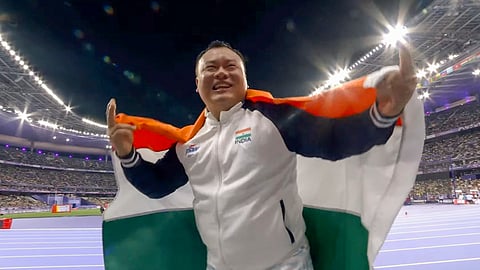

CHENNAI: Hokato Hotozhe Sema was shy of 19 and about two years into the 9th Assam Regiment as a havildar, when he lost his left leg during a counter-infiltration operation in Jammu and Kashmir in 2002.
For the next 20 years, Sema, who hails from Nagaland, was trying to pick up the pieces of whatever was left of his life. He eventually found solace in sports and on Friday night, the decision turned out to be a masterstroke as he won bronze in the shot put at the Paralympics in the F57 category.
For a man who did not know about the Paralympics a few years ago, the medal itself is a surreal journey. His 14.65m was his best effort in the sport.
Sema first tried his hand in the discus (standing throw) but since the event got scrapped from the Paralympics, he started training in the shot put.
“He joined Army Paralympic Node in Pune some two and half years ago,” said coach Rakesh Rawat, who used to train able bodied throwers in Army Sports Institute in Pune. “I even trained Kasinath (2010 Commonwealth Games medallist).”
For Sema, who hails from Dimapur, Nagaland, the sport has given a new meaning to his life. What seems even more fascinating is that he did not know much about the Paralympics before starting his sporting career some seven-eight years ago.
His coach Rawat, a Subedar Major in the node, felt that from now on Sema will only improve. “Next Paralympics the colour of the medal will be different,” Rawat said.
Rawat explained how the Army Paralympic Node selects players from the Artificial Limb Centre in Pune. This way they help athletes with disabilities to perform well and find ways to rehabilitate as well. He said that sports give them a second chance and that really helps the players.
Rawat gave the example of Sema, who apparently was just doing his normal routine job in the army.
“Sometimes para-athletes like him did not know much about Paralympics and para-sports when they started to play,” he said. “Sema too did not know much. Over a period of time he started to know and compete. After he started his shot put career two-two and a half years ago and he won the Asian Para Games medal (bronze in 2022,” said the coach.
Main challenge for a coach is to motivate them. Rawat said that the biggest difference between a para-athlete and an able bodied athlete is in their mind.
“For a para-athlete we have to keep motivating them all the time,” he told this daily. “It is not easy for them because they can get demotivated easily. They keep talking about their setbacks and somehow one has to try to motivate them and make them look at things more positively. We have to work on their minds and make them believe in themselves and then show them how sports can help them do well. As of now we have around 50 para athletes in the node.”